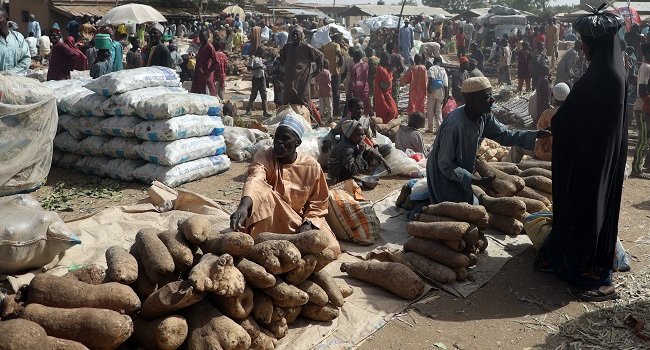ABUJA — Despite Nigeria recording its fourth consecutive drop in inflation, citizens and businesses say the much-anticipated relief is nowhere to be found, as food, fuel, and transportation costs continue to soar.
According to the National Bureau of Statistics (NBS), the country’s inflation rate fell to 21.88 percent in July, down from 22.22 percent in June. This marks a steady decline since April 2025, when it stood at 23.7 percent. The government has hailed the figures as proof of economic progress under President Bola Tinubu’s administration.
Nigeria’s rebased Gross Domestic Product (GDP), which grew to N372.8 trillion in 2024, has also been cited as evidence of stability. Former Finance Minister and WTO Director-General, Dr. Ngozi Okonjo-Iweala, even remarked during a recent visit to the president that the economy was “stabilising.”
However, many Nigerians remain unconvinced, pointing to worsening living conditions.
A 50kg bag of local rice now sells between N69,000 and N75,000 in major cities. Petrol prices hover between N865 and N925 per litre, cooking gas costs N1,000 to N1,200 per kilogram, and electricity tariffs for Band A users range from N209.50 to N231.79 per kilowatt-hour. Transport fares — by road and air — have also surged.
Experts Fault ‘Disconnect’ Between NBS Data and Reality
Economic experts who spoke to DAILY POST expressed deep skepticism over the NBS figures, warning that official statistics do not reflect the harsh realities faced by households.
Mazi Okechukwu Unegbu, former President of the Chartered Institute of Bankers of Nigeria (CIBN), dismissed the inflation report as misleading.
“There is a wide difference between the inflation figure by NBS and the reality on the ground. It is a beautiful report, but at the end of the day, there is nothing to write home about,” he said, urging government to address hunger rather than celebrate numbers.
Similarly, Gbolade Idakolo, CEO of SD & D Capital Management, said food inflation remains high due to insecurity in farming regions, exchange rate volatility, and rising logistics costs.
“The federal government needs to do more in pushing its agricultural policies to reduce the causative factors affecting food inflation,” he noted.
Renowned economist Prof. Segun Ajibola explained that Nigeria’s inflation computation may not reflect the full reality.
“The inflation figure is derived from a basket of consumer goods. But since the basket is not all-inclusive, a drop in some items may suggest lower inflation, while other essential items remain high,” he said.
Hungry Nigerians, ‘Too-Good’ Statistics
While the government celebrates declining inflation, the gap between statistics and street-level realities is widening. Nigerians say the numbers look good on paper but fail to translate into cheaper food, energy, or transport.
As one economist put it, the figures may be technically correct, but the real economy tells a harsher story: “Beautiful statistics, but hungry Nigerians.”

Comments